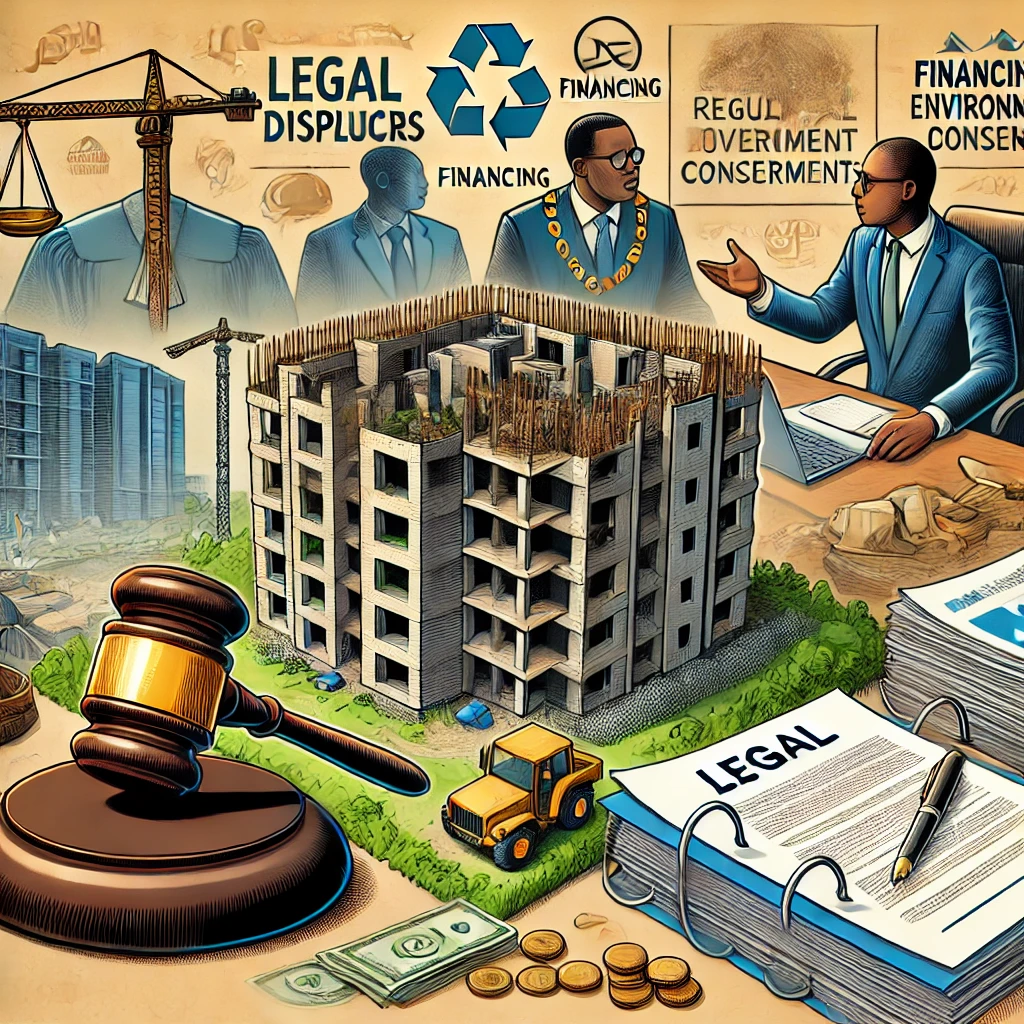Introduction
Real estate development in Nigeria is a highly profitable yet complex industry that requires strategic planning and legal due diligence. Despite its potential for high returns, developers must navigate a challenging landscape filled with regulatory hurdles, financing difficulties, community disputes, and environmental concerns. Failure to address these legal issues can lead to costly delays, financial losses, or even project cancellations.
As a seasoned property lawyer, I have worked closely with developers, investors, and property owners to resolve complex legal challenges. This article provides a detailed breakdown of the key legal issues affecting real estate development in Nigeria and practical solutions to mitigate them.
Land Acquisition and Ownership Issues
- Acquiring land in Nigeria is one of the most challenging aspects of real estate development. Issues include:
- Multiple ownership claims leading to disputes.
- Lack of verifiable land documents such as Certificates of Occupancy (C of O), Deeds of Assignment, or Governor’s Consent.
- Encumbrances such as mortgages, liens, or government acquisition status.
- Fraudulent land transactions where sellers do not legally own the land.
- Customary land rights conflicts, especially in rural areas.
Solution
- Conduct a thorough land verification process by checking records at the Land Registry.
- Engage a property lawyer to review legal documents and confirm ownership status.
- Obtain necessary approvals such as Governor’s Consent or Land Use Allocation.
- Avoid purchasing land under government acquisition without obtaining excision or gazette approval.
Regulatory Compliance and Government Approvals
Nigeria has stringent real estate regulations that developers must adhere to. These include:
- Zoning laws that determine permitted land use (residential, commercial, or industrial).
- Building codes that establish safety and construction guidelines.
- Environmental Impact Assessments (EIA) for large-scale developments.
- Development permits from state urban planning authorities.
- Failure to comply with these regulations can result in:
- Demolition orders for illegal developments.
- Heavy fines and legal sanctions.
- Project delays due to approval bottlenecks.
Solution
- Consult a real estate lawyer to ensure compliance with zoning and building regulations.
- Secure all necessary permits and approvals before construction begins.
- Engage urban planners and environmental experts to handle regulatory filings.
Documentation and Contractual Challenges
- Poorly drafted contracts can lead to costly legal disputes. Common documentation issues include:
- Ambiguous terms in joint venture agreements and purchase contracts.
- Incomplete lease agreements, leading to rental disputes.
- Breach of contract by contractors, suppliers, or tenants.
Solution
- Ensure all agreements are drafted and reviewed by experienced real estate lawyers.
- Clearly define roles, responsibilities, and obligations in contracts.
- Include dispute resolution clauses to handle potential breaches.
Financing and Taxation Hurdles
Real estate projects require significant funding, and many developers struggle with:
- High-interest rates on loans.
- Defaulting on loan repayments, leading to foreclosures.
- Tax obligations such as Capital Gains Tax, Stamp Duty, VAT, and Property Tax.
Solution
- Develop a comprehensive financial strategy before securing funding
- Seek legal advice on loan agreements to avoid predatory terms.
- Work with tax experts to optimize tax benefits and ensure compliance.
Community and Stakeholder Disputes
- Local communities often resist development projects due to:
- Land ownership claims by indigenous groups.
- Environmental concerns related to noise, pollution, and land use.
- Displacement of residents, leading to legal action.
Solution
- Engage in community relations programs before starting a project.
- Implement Corporate Social Responsibility (CSR) initiatives to build goodwill.
- Establish legal agreements with community representatives to prevent disputes.
Delays in Project Approvals
Government bureaucracy can slow down project approvals, leading to significant financial losses.
Solution
- Begin the approval process early to accommodate delays.
- Work with professionals who have experience dealing with government agencies.
- Ensure that all required documents are correctly filed to prevent unnecessary rejections.
Environmental and Sustainability Compliance
- Government authorities now require real estate projects to meet environmental standards, including:
- Energy-efficient designs and sustainability practices.
- Proper waste management systems.
- Water and air quality control measures.
Solution
- Conduct Environmental Impact Assessments (EIA) before project commencement.
- Implement sustainable building practices to comply with environmental laws.
Labour and Construction Disputes
Construction-related disputes arise from:
- Breach of contract by contractors or subcontractors.
- Non-payment of workers, leading to strikes or lawsuits.
- Poor workmanship, leading to structural failures or safety violations.
Solution
- Draft clear and enforceable contracts with contractors and suppliers.
- Regularly inspect project sites to ensure quality control.
- Resolve disputes through mediation or arbitration to avoid lengthy court battles.
Changing Government Policies and Legal Frameworks
Frequent changes in real estate laws and policies create uncertainties for developers. These include:
- New property tax regulations affecting investment costs.
- Revised zoning laws that restrict property use.
- Policy shifts affecting land tenure and ownership rights.
Solution
- Stay updated on legal changes by consulting real estate lawyers.
- Join real estate associations that provide regulatory updates.
- Incorporate legal flexibility into development plans to accommodate policy shifts.
Dispute Resolution and Litigation Risks
Real estate disputes often arise due to:
- Land ownership conflicts.
- Contract breaches
- Tenant and landlord disputes.
Solution
- Utilize Alternative Dispute Resolution (ADR) mechanisms like mediation and arbitration.
- Seek expert legal representation for complex litigation cases.
- Maintain thorough records of all transactions and agreements to strengthen legal claims.
Conclusion
Real estate development in Nigeria presents numerous legal challenges, but with proper legal guidance and strategic planning, developers can mitigate risks and maximize profitability. By proactively addressing land acquisition issues, regulatory compliance, financing concerns, and community relations, investors can ensure smooth project execution.
At Chaman Properties, we specialize in providing legal and strategic support to help real estate developers navigate these challenges and achieve their investment goals.
📞 Contact Information:
✅ Chaman Law Firm – www.chamanlawfirm.com
✅ Chaman Properties – www.chamanproperties.com
✅ Phone: 08065553671, 08096888818
✅ Email: chamanlawfirm@gmail.com | chamanpropertiesltd@gmail.com
Secure your real estate investments with expert legal guidance! 🚀


